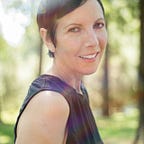My Climate Policy: Feed the Animals
My carbon offsets are weighed out in sugar water. I could donate to an organization that may or may not plant trees who will need 100 years to start sinking carbon like their predecessors. Instead I wake up before dawn on a freezing Pacific Northwest day and add the proper ratio of sugar and water together, four to one, and allow it to simmer quietly on the stove. Most days I wake before them, with the hope that they come out of torpor to fresh nectar.
Our first visitor to the small red glass feeder was Joy. I’m aware that some think naming wild animals, or even any animal at all is problematic yet I had just wrapped up coursework in climate change and I needed a reminder that the world was still a beautiful place — that there was joy, even with all of the losses. So, here she was, with her iridescent throat and alert demeanor, letting me know that Nature was fully alive, with fast heartbeats and unimaginable colors.
Anna’s hummingbirds are territorial. Joy was fierce in keeping other hummers away from our tiny balcony sanctuary, using her precious energy to chirp-chirp-chirp them on. Anna’s do not migrate to warmer climates once snow and ice cover the landscape. Instead, they rely on food sources such as insects and our balcony feeders in order to survive the increasingly harsh Pacific Northwest winters. However, as the temperatures plummeted, that energy became too vital of a resource, and Joy may have put aside her competitive trait and welcomed all the neighborhood friends to the feeder.
My carbon footprint is on the lighter side yet I wake up worrying about my neighborhood Animals — Coyote once the berries run out, or the Geese without places to rest mid-migration. Human efforts to mitigate and adapt to a rapidly changing climate remain anthropocentric. It seems that we don’t want to fit into our biotic community, the family, the cast of characters. We made ourselves pseudo-soloists but the Earth is a chorus! We silenced the songs by our actions, as Rachel Carson feared, so I feed Joy, giving some sweetness back to the world and on some days, my own heart.
It wasn’t just Joy that kept my soul alive during the complicated circumstances of pandemic life. Shelter in place meant creating shelter for whoever I could. On most days, this also included Mourning Dove, Towhee, Sparrow, Chickadee, Nuthatch and Thrush. Bird seed became my offering, my prayer and my morning ritual. Before I sat on my meditation cushion, my mind focused its attention, not on the breath, but on the birds.
Soon we started to receive notices on our front door, that we had broken the community rules by leaving “trash” on our balcony. I called the main office to further understand what we had supposedly done, only to find out that our neighbors two floors down had complained multiple times that bird seed was falling down onto their patio, and blowing into their newborn baby’s face. Even as my temper ignited, I made promises to be more mindful when I swept, and move our feeders away from the edge of our balcony, with the hopes that we could remedy the situation and continue making offerings to our friends in need.
Another week went by, another notice, this time warning of fines and litigation if we did not comply. I tried to hold off on calling the office again, yet I felt that my very joy was being threatened, and wouldn’t you agree that any newborn coming in the world will have far greater problems to face than a little millet raining down upon her? When the front apartment manager insisted “but they have a baby!” All I remember is bracing myself on the kitchen sink, leaning in to say “That argument does not hold for someone like me.” Only the hummingbird feeders were to remain. The next morning, I closed the curtains so I wouldn’t see Mourning Dove, Sparrow, and Chickadee search for food while their supplemental resources had vanished. I wept for all their losses and mine too. I tried to hold compassion in my heart for the family downstairs, and I remain confused as to why humans always take precedent. Doesn’t everyone see the plight of the Animals as human activity continues to fragment habitats and intensify climate change? And, when we do make those connections, is it not our moral responsibility to help when and where we can?
Two months later, we gave our notice and moved to Oregon City. Our home sits in a more rural area just south of Portland. When we first visited the house, I heard birds in the backyard and knew that I could feed them without receiving threatening notices on our front door. Even in my celebratory mood, my heart broke for Joy and her family, knowing that soon their food supply would diminish, and they would have to endure a winter without my early morning ritual and sweet nectar. I gifted a feeder and a mason jar of sugar water to my neighbor — not that one — with the hopes that my small legacy in building 600 could continue. Our own feeders were the last item we moved to the new house.
Now as I write this, I wait for the slightest hint of daylight outside, and I will take seed and nuts for everyone to have breakfast at sunrise, walk my dog, and sit and watch our Animal friends while I have breakfast with them. I think of my time fighting those who think that humans are separate from Nature, and the baby who will have to re-wild themselves if they are to survive in our breaking world. I’m grateful that I know people who speak my language, perhaps a language lost, and one we’re trying to find again.
